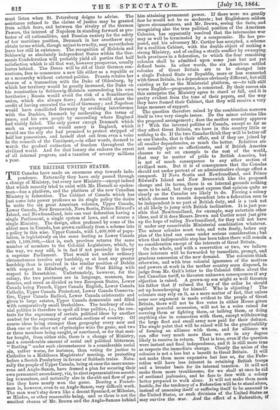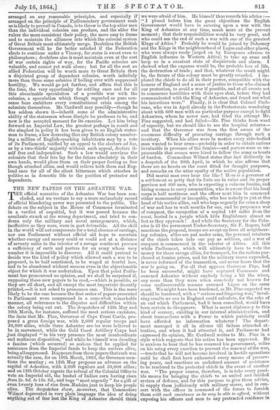must listen when St. Petersburg deigns to advise. The him
attaining permanent power. If there were we greatly assistance refused to the claims of justice may be granted fear he would not be so moderate ; but Englishmen seldom from selfish fears, and between the rivalry of the German ignore circumstances, and Mr. Brown, seeing the facts, and Powers, the interest of Napoleon in standing forward as pro- recognizing also the true political position of the American teeter of all nationalities, and Russian anxiety for the safety Colonies, has apparently resolved that the internecine war of her maritime position, Denmark in her overthrow may may as well be terminated by a compromise. He has pro- obtain terms which, though unjust to cruelty, may nevertheless posed, and his adversary Mr. Cartier has accepted, a scheme leave her still in existence. The recognition of Holstein and for a coalition Cabinet, with the double object of making a Schleswig as absolutely independent States within the Ger- strong Ministry, and of ending a sterile conflict by swamping, manic Confederation will probably yield all parties that half both provinces m a federation, to which the four remaining satisfaction which is all that war, however prosperous, usually colonies shall be admitted upon some just but not yet leaves behind. The Danes will be rid of their German con- defined basis. In other words, the six American settled nections, free to commence a new life either as a republic or colonies of Great Britain are to be changed into as a monarchy without external politics. Prussia retains her a single Federal State or Republic, more or less connected chance of a transaction with the Duke of Oldenburg, by with Great Britain, in a dependence obviously different, but still which her territory would • be greatly increased, the Duke on existing as far as the Ministerial platform, or—to talk still his nomination to Schleswig-Holstein surrendering his own worse English—programme, is concerned. By their succes sin territories ; Russia would avoid the risk of a Scandinavian this enterprise the Ministry agree to stand or fall, and it LI- union, which she always fears ; Austria would share the pretty evident from the tone of their papers, and the way credit of having executed the will of Germany; and Napoleon they have framed their Cabinet, that they will receive a very would have conciliated Germany by avoiding interference large measure of support. with the Duchies, Denmark by moderating the terms of The question therefore raised by the combination narrows• peace, and his own people by succeeding where England itself to two very simple issues. Do the minor colonies like- had visibly failed. The only power except Denmark which the proposed arrangement ; does the mother country approve such an arrangement would annoy is England, which it ? With the internal politics of Canada, except so far as would see the ally she had promised to protect stripped of they affect Great Britain, we have in this country little or half her possessions, and herself shut out from even a voice nothing to do. If the two Canadas think they will be better off in the councils of the Continent,—in other words, doomed to as one Canada, that is their affair, and if they are joined by watch the gradual extinction of freedom throughout the all smaller dependencies, so much the better. Relatives are civilized world. And for that luxury she endures the arrest not usually quite so affectionate, and if British America of all internal progress, and a taxation of seventy millions chooses to set an example to the rest of the world,. a year. that may be matter of pride to British America, but is not of much consequence to any other section of is not of much consequence to any other section of THE Canadas have made an enormous step towards inde- should not under pretext of an administrative change effect a pendence. Externally they have only passed through conquest. If Nova Scotia and Newfoundland, and Prince a change of Ministry, but every new Ministry—except indeed Edward's Island and New Brunswick like the proposed that which recently tried to exist with Mr. Disraeli as spokes- change and its terms, there is on internal grounds nothing man—has a platform, and the platform of the new Canadian more to be said, but they must express that opinion quite as Ministry is federation. The Cabinet of Canada which has clearly as the Canadas are likely to do. Forcing a colony just come into power professes as its single policy the desire which chooses to remain dependent into a federation sure to to unite the six great American colonies, Upper Canada, be independent is no part of British duty, and is a task not Lower Canada, New Brunswick, Nova Scotia, Prince Edward's at all likely to jump with British inclination. It is just pos- Island, and Newfoundland, into one vast federation having a Bible that Newfoundland, for example, may entertain other single Parliament, a single system of laws, and of course a ideas, and if it does Messrs. Brown and Cartier must just give single Ministry. The design, often professed by some of the up the hope of ruling Newfoundland, for they will not have- ablest men in Canada, has grown suddenly from a scheme into it under any conceivable Ministerial combination whatever. a policy in this wise. Upper Canada, with 1,400,000 of popu- The minor colonies must vote, and vote freely, before any lation, is legislatively on the same footing as Lower Canada plan of the kind can come under serious consideration ; but with 1,100,000,—that is, each province returns the same when that indispensable step has been taken there will remain e number of members to the Colonial Legislature, which, by no consideration except of the interests of Great Britain. arranged on any reasonable principles, and especially if arranged on the principle of Parliamentary government such as is likely to prevail in Canada, is to throw to the top abler men than the individual colonies can produce, and the abler the rulers the more consistent their policy, the more easy to frame and to maintain the alliances into which the colonial system of Great Britain must ultimately merge. Doubtless the British Government will be far better satisfied if the Federation elects to continue under a Viceroy, for status is sweet even to philosophers ; doubtless also it must maintain even at the cost of war certain rights of way, for the Pacific colonies are valuable, and cannot yet walk alone; but for all the rest an allied Federation will be worth more to Great Britain than a disjointed group of dependent colonies, worth infinitely more than those same colonies if boiling over with suppressed hostility,. We would go yet further, and affirm that this is the time, the very opportunity for settling once and for all this abominable speculation of a possible war with the colonies, a speculation which though regarded as pure non- sense here embitters every constitutional crisis among the colonists themselves. Mr. Cardwell may possibly—though he has seldom shown it—inherit some of the administrative ability of the statesman whose disciple he professes to be, and now is the accepted moment for its exercise. Let him bring forward an Imperial Law, the greatest perhaps in result and the simplest in policy it has been given to an English states- man to frame, a law decreeing that any British colony number- ing a million of English-speaking inhabitants may by a vote of its Parliament, ratified by an appeal to the electors ad hoc, or by a two-thirds' majority without such appeal, declare it- self free and independent. Such a law would convince the colonists that their fate lay for the future absolutely in their own hands, would place them on their proper footing as free though attached allies, and would relieve both them and Eng- land once for all of the silent bitterness which attaches in politics as in domestic life to the position of protector and dependents.































 Previous page
Previous page